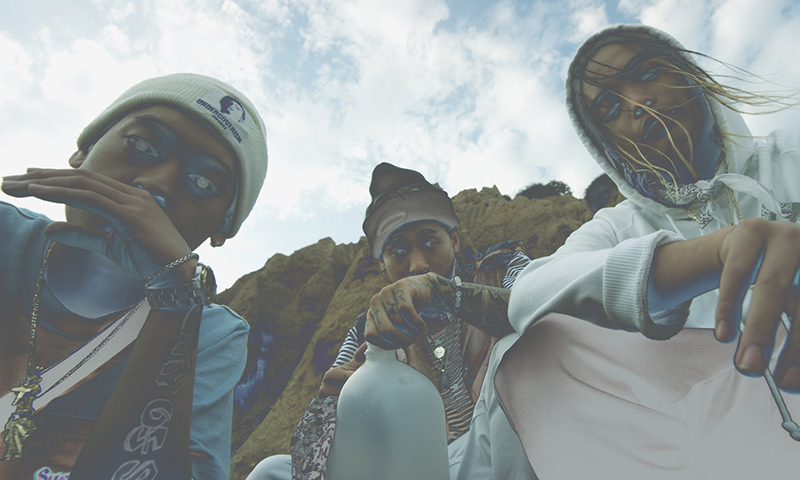“Hip-hop is not either a multiracial art form or a Black one. Rather, hip-hop is a multicultural production of Black popular culture.” This quote from Professor Nitasha Tamar Sharma of Northwestern University brings up the issue of race that is heavily debated in the hip-hop community. Throughout the years, hip hop has been very progressive, and there is diversity in the genre. Nevertheless, the genre is still very much dominated by black artists. It is no secret that the genre was built on “Blackness” and, to an extent, black masculinity. These motifs stand in stark contrast with the concept of Asian masculinity and the stereotypes associated with it. In his paper, Oliver Wang said that “black masculinity is associated with stereotypes of hypermasculinity and sexuality, physical aggression, and the underclasses, these stand in almost diametric opposition to so-called model minority of Asian masculinity: effete an asexual, passive, and middle class.”(41) This raises an issue: is traditional “Asianness” a blockade for Asian-Americans in the hip-hop genre?
Since its origins, hip-hop has progressed immensely. The genre has had different eras, such as gangster rap and the Golden Age, with different styles that shared the same purpose: to be a tool for expression. Zulu nation, one of the first hip-hop groups ever created, was formed in 1970 by a group of reformed gang members to promote the message of “peace, love, unity and having fun” in hip-hop and through hip-hop. NWA, an organization that basically founded gangster rap, was created as a reaction to police brutality and as a form of resistance through music. MC Humanity of Staten Island once said,
“The ability of rap to [express] so much of what’s going on a person’s mind was something that drew me to it.”
Hip-hop at its earliest stage had a strong “black” identity, but today as long as you’re spitting your thoughts out over some beats, you are a part of the hip-hop community.

Dumbfoundead, a Korean-American rapper, is the one of the frontmen for Asians in the hip-hop industry. Starting as a battle rapper as far back as 2005, Dumbfoundead, or Jonathan Park, can be a considered a veteran in the game. In an interview, Park commented that he didn’t see being Asian as a disadvantage: “as far as rap goes, I did look at it as an advantage by being different. I think that’s the attitude that a lot of Asian-Americans like to have when coming into the entertainment industry now. You know, right now, it’s like a gold rush. They want diversity, they want to break up white-washed [projects], they want ethnic faces in there.” In the age of the internet, all the information in the world is only a click away. It is insanely difficult for users to find new content. An Asian-American entering the battle rap was something new, and something extremely courageous. Park entered rap battles with all the doubt in the world on his shoulders, but killed it in the King of the Dot Rap Battles and scored millions of hits on YouTube while gaining quite a sizable following including the attention of celebrities like Drake–barely a rapper but hey, he’s famous. Throughout his career, Dumbfoundead not only broke the stereotype that battle rappers can’t make music, but also established an Asian-American presence in the hip-hop community. He has used hip-hop as a heuristic device to talk about Asian-American issues such as the whitewashing of Asian-influenced work in his song, “Safe.” He has used the genre as a device to express his thoughts towards Trump and police violence through the songs “We Might Die” and “Harambe,” respectively. Park’s work in the genre showed that “Asianness” can be purposeful, strong, and opinionated.

“As of today, Hip-hop has become a global phenomenon where it ranges from a genre of music to a full-blown lifestyle.” This quote from the Hip Hop Culture center sums up the influence of hip-hop globally. From the Higher Brothers in China, to artists like Keith Ape and Okasian in Korea, to the internet sensation Rich Chigga AKA Brian Immanuel in Indonesia, hip-hop has definitely established a global influence. The influence of these international Asian artists has also had an effect on music in the United States. When Rich Chigga dropped his first rap single “Dat $tick,” which currently has over 45 million hits on Youtube, it was met with a multitude of appraisal from artists the like of the legendary Ghostface Killah of the Wu-Tang Clan and Tory Lanez, who called Imanuel “the hardest n-gga of all time.” Only months later, Imanuel was able to score a collaboration with Ghostface Killah in the “Dat $tick” remix. Imanuel’s flow, delivery, use of irony and humor, rhythm and overall talent rewarded him, not the presence of presence or the lack of “Blackness.” Korean rapper Keith Ape made history when he infused Atlanta trap beats with Korean and Japanese lyrics in the song “It G Ma.” The song made history as it would open a brand new door for Asian rappers and pretty much invented a sub-genre that was multilingual. Keith Ape’s unique fashion and language all pointed towards Korean culture but none reinforced the traditional “Asianness.” Asian-Americans in today’s hip-hop have erased the historical stereotype that painted Asians as a whole as passive and feminine, and established a future for anyone with a dream of hip-hop.

- China’s Higher Brothers

Extremely educational….looking forward to returning. http://capture-the-frag.de/index.php?mod=users&action=view&id=104774
LikeLike